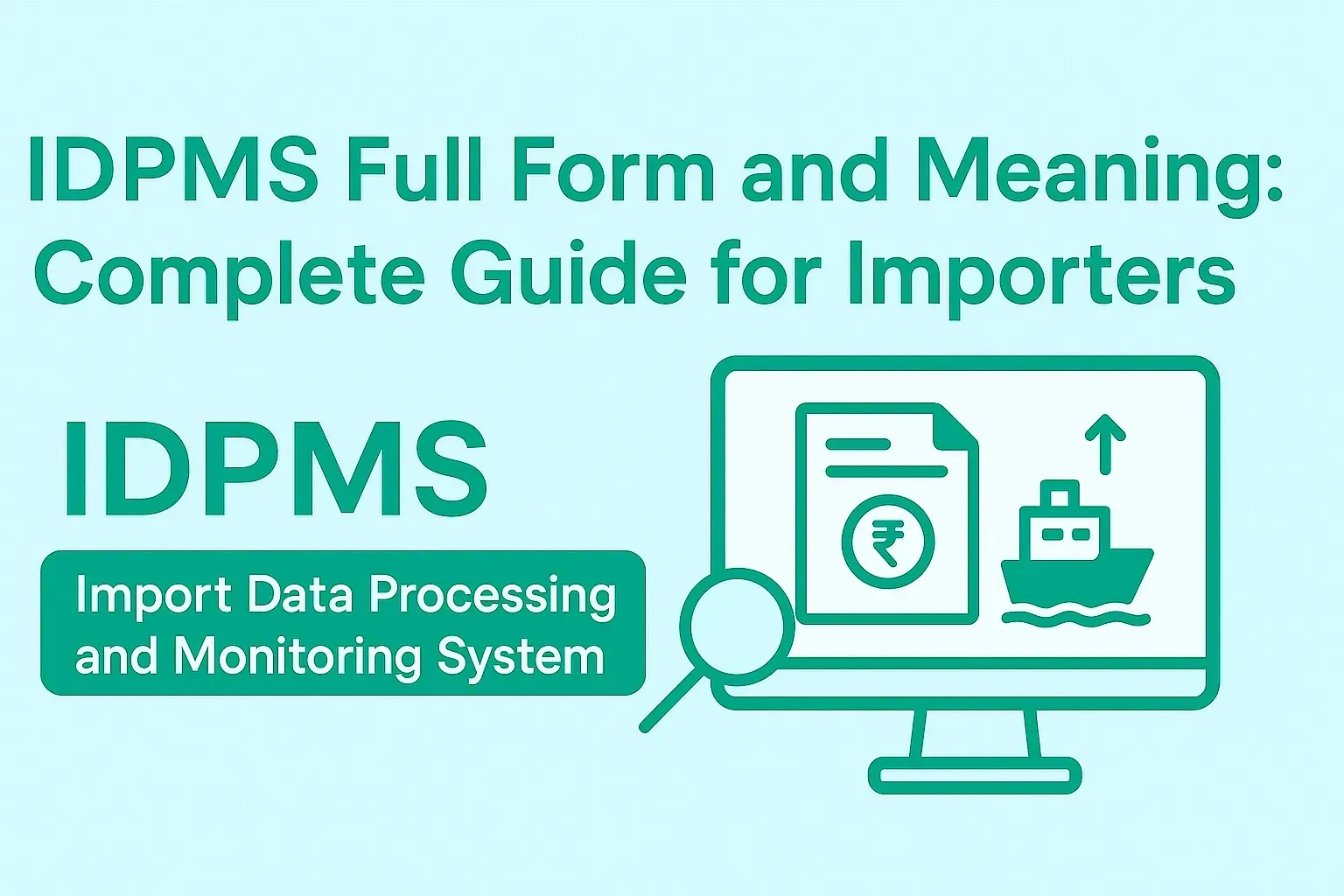IDPMS Full Form and Meaning: Complete Guide for Importers
Learn about IDPMS full form, meaning, and its vital role in import monitoring for Indian businesses. Understand how IDPMS differs from EDPMS and why it matters for compliance

For Indian importers, compliance and accurate reporting to the Reserve Bank of India (RBI) are essential parts of running an international business. The IDPMS system is a digital backbone ensuring transparency, security, and efficiency in import transactions. But what does IDPMS mean, and why is it so important for importers today?
What is the Full Form of IDPMS?
IDPMS stands for Import Data Processing and Monitoring System. Introduced by the Reserve Bank of India, IDPMS is a centralized, online platform used to digitally track and monitor all import transactions that take place in India.
IDPMS Meaning in Banking
IDPMS is a digital system aimed at resolving the delays, inaccuracies, and disconnect that originated with paper-based monitoring of import payments and documentation. It creates a centralized repository for all stakeholders involved—banks, customs, importers, and regulators—enabling them to:
- Track the full import cycle from initiation to closure
- Ensure that all foreign currency payments for imports correspond with the actual goods entering India
- Digitize documentation and reporting to minimize errors
- Automate compliance with RBI’s regulations
Before IDPMS, manual entries led to mismatches and compliance issues, causing delays and regulatory scrutiny.
How Does IDPMS Work?
Step-by-Step Overview:
- Data Entry by Customs: When goods arrive, customs authorities upload details of the import—like value, quantity, and Bill of Entry—into IDPMS.
- Bank Integration: When the importer initiates a payment (e.g., via SWIFT or a Letter of Credit), the bank inputs details into IDPMS, referencing the Bill of Entry.
- Matching Process: The system automatically matches details from customs (goods cleared) and banks (payment made).
- Monitoring and Alerts: Mismatches, delays, or missing information are flagged for review to ensure that no violation of FEMA (Foreign Exchange Management Act) or RBI norms occurs.
- Closure: Once goods are received and payment completed, the transaction is marked as closed in IDPMS.
Key Features and Benefits of IDPMS
- Real-Time Tracking: Businesses, banks, and regulators can track import payments and status in real time.
- Standardization: Ensures uniformity of import data nationwide.
- Regulatory Compliance: Strengthens adherence to RBI, FEMA, and Customs regulations.
- Digital Documentation: Vastly reduces paperwork; everything is available electronically.
- Automated Alerts: Importers and banks receive notifications for pending or unmatched items, reducing compliance risks.
- Centralized Historical Record: Easy retrieval of old import transaction data for audits or reference.
Who Uses IDPMS?
- Importers and their authorized banks
- Customs authorities
- RBI and regulators
- Auditors and compliance officers
Note: Only authorized users (banks and customs) can upload data; importers can check and download their transaction records.
IDPMS vs. EDPMS: What’s the Difference?
Why is IDPMS Important for Indian Businesses?
- Reduces delays and compliance risks
- Prevents misuse of foreign exchange
- Enables easy reconciliation of payments and physical imports
- Streamlines trade finance and documentation
- Centralizes communication among all parties
Non-compliance with IDPMS can lead to regulatory penalties, delayed clearances, or being listed for stricter monitoring.
Conclusion
The Import Data Processing and Monitoring System (IDPMS) is an essential part of India’s international trade compliance. For importers, understanding IDPMS full form, meaning, and process is crucial to avoid delays, mismatches, and regulatory issues.
By maintaining proper documentation, submitting your Bill of Entry on time, and staying in touch with your Authorized Dealer bank, you can ensure smooth import payments and stay fully compliant with RBI’s rules.
Together with EDPMS for exporters, IDPMS ensures that India’s foreign trade remains transparent, efficient, and globally trusted.
FAQs on IDPMS
What is the full form of IDPMS?
IDPMS full form is Import Data Processing and Monitoring System.
What is IDPMS in banking?
It is an RBI system used by banks to track and monitor all import payments and ensure compliance.
Why was IDPMS introduced?
It was introduced to digitize and monitor import transactions, reduce fraud, and ensure compliance with foreign exchange rules.
What is the difference between IDPMS and EDPMS?
IDPMS monitors imports, while EDPMS monitors exports. Both are RBI systems for trade compliance.
Who manages IDPMS?
The Reserve Bank of India manages IDPMS in coordination with Authorized Dealer banks and Customs.
Do importers need to register separately for IDPMS?
No, importers don’t need to register. Banks automatically update the system when payments and Bills of Entry are filed.
What happens if import transactions remain pending in IDPMS?
If transactions remain pending, the bank may follow up with the importer and report the case to RBI.
Can IDPMS payments be tracked online?
Yes, importers can track their import payment status through their bank.
What documents are required for IDPMS compliance?
Importers need to provide the Bill of Entry, Invoice, and Payment Proof to the bank.
Does IDPMS apply to services imports also?
Yes, IDPMS applies to both goods and services imports.